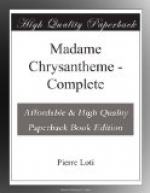Some Japanese Watteau must have mapped out this Donko-Tchaya, for it has rather an affected air of rurality, though very pretty. It is well shaded, under a shelter of large trees with dense foliage, and a miniature lake close by, the chosen residence of a few toads, has given it its attractive denomination. Lucky toads, who crawl and croak on the finest of moss, in the midst of tiny artificial islets decked with gardenias in full bloom. From time to time, one of them informs us of his thoughts by a ‘Couac’, uttered in a deep bass croak, infinitely more hollow than that of our own toads.
Under the tent of this tea-house, we sit on a sort of balcony jutting out from the mountain-side, overhanging from on high the grayish town and its suburbs buried in greenery. Around, above, and beneath us cling and hang, on every possible point, clumps of trees and fresh green woods, with the delicate and varying foliage of the temperate zone. We can see, at our feet, the deep roadstead, foreshortened and slanting, diminished in appearance till it looks like a sombre rent in the mass of large green mountains; and farther still, quite low on the black and stagnant waters, are the men-of-war, the steamboats and the junks, with flags flying from every mast. Against the dark green, which is the dominant shade everywhere, stand out these thousand scraps of bunting, emblems of the different nationalities, all displayed, all flying in honor of far-distant France. The colors most prevailing in this motley assemblage are the white flag with a red ball, emblem of the Empire of the Rising Sun, where we now are.
With the exception of three or four ‘mousmes’ at the farther end, who are practising with bows and arrows, we are today the only people in the garden, and the mountain round about is silent.
Having finished her cigarette and her cup of tea, Chrysantheme also wishes to exert her skill; for archery is still held in honor among the young women.
The old man who keeps the range picks out for her his best arrows tipped with white and red feathers—and she takes aim with a serious air. The mark is a circle, traced in the middle of a picture on which is painted, in flat, gray tones, terrifying chimera flying through the clouds.
Chrysantheme is certainly an adroit markswoman, and we admire her as much as she expected.
Then Yves, who is usually clever at all games of skill, wishes to try his luck, and fails. It is amusing to see her, with her mincing ways and smiles, arrange with the tips of her little fingers the sailor’s broad hands, placing them on the bow and the string in order to teach him the proper manner. Never have they seemed to get on so well together, Yves and my doll, and I might even feel anxious, were I less sure of my good brother, and if, moreover, it was not a matter of perfect indifference to me.
In the stillness of the garden, amid the balmy peacefulness of these mountains, a loud noise suddenly startles us; a unique, powerful, terrible sound, which is prolonged in infinite metallic vibrations. It begins again, sounding more appalling: ‘Boum!’ borne to us by the rising wind.




